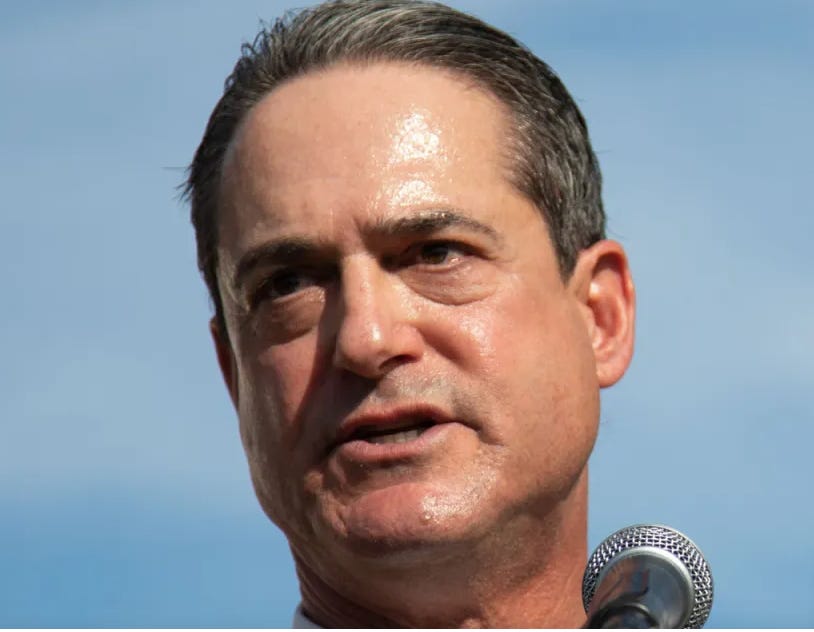What everybody misses about 'tough-on-crime' prosecutors
Do tough-on-crime policies increase violent crime?
San Francisco district attorney Chesa Boudin is at it again, undermining public safety by driving up violence, reports the New York Times. “The U.S. Has a Violence Problem, and It’s Up to Democrats to Solve It” reads an op-ed by Michael Javen Fortner, a professor at Claremont McKenna College.
“Progressive prosecutors, like Alvin Bragg in Manhattan, Chesa Boudin in San Francisco and George Gascón in Los Angeles, are still dogmatically devoted to reducing law enforcement’s footprint,” he writes, after noting that violent crime has increased. “At the same time, some Democratic mayors who once embraced the righteous indignation of grass-roots efforts to defund the police, like London Breed in San Francisco, have had a change of heart.” The former are ideologues, he suggests, sticking to failed policy that reflects their values more than it does reality on the ground, while the latter are flexible policy makers responding to voter needs.
This type of op-ed is typical of mainstream coverage that suggests progressive prosecutors are unresponsive to the needs of their constituents, especially poor Black people who are victimized more often, and that they’re engaged in magical thinking about "Man's Inhumanity to Man" or whatever. Curiously missing in op-eds about progressive prosecutors and crime are numbers about progressive prosecutors and crime, as well as they’re counterparts: conservative prosecutors and crime. Let’s take a look at the latter.
Orange county District Attorney Todd Spitzer generally postures as “tough-on-crime,” and has called on the state to restart the death penalty. Yet, according to data from the Orange County Sheriff’s Department, there were at least 88 homicides in 2021, the highest number in Orange County since 1999, when OC District Attorney Todd Spitzer took office.
It’s possible Spitzer’s performance has lagged while he’s battled five sexual harassment lawsuits. But he’s not the only conservative DA with a poor safety record—he’s not even the only one in California. Anne Marie Schubert, DA of Sacramento, is running for state Attorney General. She spends a lot of time talking about the “chaos” unleashed by the progressive policies of Chesa Boudin, yet homicides have decreased in San Francisco since Boudin has been in office, and they’ve gone up in Sacramento with Schubert at the helm of law and order.
Despite DA Michael Hestrin’s tough-on-crime postures, the crime rate in Riverside, California is higher than in 83.9 percent of US cities—including violent crime. “In the last 5 years Riverside has seen rise of violent crime and decline of property crime,” according to the City-Data crime index. The Federal Bureau of Investigation found that there were 1,686 violent crimes in Riverside in 2019, 17 murders, 139 rapes, 1,054 robberies, over 1,000 property crimes. Rapes, robberies, burglaries and assaults have all been the same or higher than the state average since 2016, Hestrin’s first year in office.
Why is that? It could be that one thing has nothing to do with the other thing; or that cities with worse crime elect tougher DAs; or that more progressive cities have better safety nets; or one million other things.
But there’s evidence that “tough-on-crime” policies themselves create a dynamic in which violent crime flourishes. In a 2021 academic paper that looked at crime rates in Suffolk County, Massachusetts, three economists compared crime rates under a conservative DA and crime rates under progressive DA Rachael Rollins. As WBUR reported:
Researchers from three universities analyzed 67,553 misdemeanor cases in Boston, Winthrop, Revere and Chelsea from 2004 to 2018, which didn't include the tenure of current District Attorney Rachael Rollins. She took office in 2019.
People arrested but not prosecuted on low-level, nonviolent misdemeanors — like shoplifting, drug possession or motor vehicle offenses — were 58% less likely to commit another crime in Suffolk County in the following two years, according to the study.
"Our results imply that a prosecutor's decision to not charge a defendant with a nonviolent misdemeanor significantly reduces their probability of future criminal legal contact," Rutgers University professor Amanda Agan, one of the researchers, said. "Or put the other direction: prosecuting these defendants actually decreases public safety."
Yes, it sounds counterintuitive, but it’s not. Although many sentences are insanely long, in cases that are not high profile, prosecutors tend to settle on a less severe punishment to get a guilty plea without trial (if someone’s like, “Plead guilty and get two years or go to trial and we will fuck you to Hell with two decades” most people would, and do, plead out). So you’re not removing people from the community, your temporary putting them behind bars, where they might be traumatized or link up with other people who’ve committed violence, and then releasing them back into the community, with more trauma and less — or no — access to the things that give people dignity and purpose. In theory jail might “scare someone straight” but then what are they going to do with that if their kids have been taken away, they can’t find work, and they have to report back to parole officers 100 times a day?
When you think a little deeper than your average New York Post pun-line, you’d realize that virtually the only type of crime that is more likely than not to escalate into a homicide if it’s not prosecuted is domestic violence, which one imagines is one of the reasons Manhattan DA Alvin Bragg explicitly stated in his day one memo that domestic violence should always be taken seriously.
“The stakes couldn’t be higher,” Fortner concludes. “If progressive prosecutors and professional Democrats fail to execute a coordinated approach that blends effective, targeted law enforcement with robust social policies, violence will continue to rise.”
Yes! In conservative districts!




